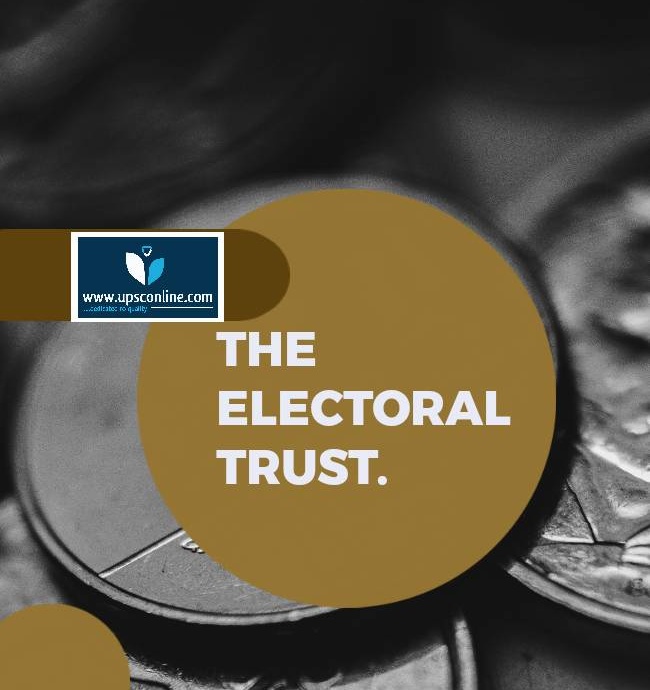An Electoral Trust (ET) is a body registered under the Companies Act, 1956, solely tasked with distributing contributions received from individuals or companies to political parties.
An Electoral Trust is a Trust set up by companies with the sole objective to distribute the contributions received by it from other Companies and individuals to the political parties.
Electoral trusts were set up under the Electoral Trusts Scheme, 2013 with the Centre framing rules for the eligibility and procedure for registering such trusts on January 31, 2013.
As per the rules, an electoral trust is allowed to receive voluntary contributions from individual Indian citizens, a company registered in India, a firm, or Hindu undivided family (HUF) in the form of a cheque, bank draft or electronic transfer to its bank account.
No foreign entity, other registered electoral trusts, or individuals who are neither citizens nor residents of India can contribute to electoral trusts. An ET must distribute up to 95% of the voluntary contributions collected, with the surplus brought forward from the earlier year, to eligible political parties only. The remaining 5%, with a cap of ₹3 lakh, may be used for managing its own affairs.
These trusts are not allowed to use any contribution for the direct or indirect benefit of its members or contributors. They must also maintain accounts of the donors and their contributions, funds distributed to political parties, and expenses incurred by the trust.
The accounts of any ET must be audited and the report must be furnished to the Commissioner of Income Tax, including the list of contributors, list of parties that funds were distributed to, and the amounts disbursed.
As of date, eighteen electoral trusts are active, with the biggest being Prudent Electoral Trust, which has multiple corporate donors. In 2022-23, only five ETs — Prudent Electoral Trust, Samaj Electoral Trust, Paribartan Electoral Trust, Triumph Electoral Trust and Einzigartig Electoral Trust — received contributions from corporate houses, according to the Association for Democratic Reforms (ADR).
The electoral trusts have to apply for renewal every three financial years. They must donate 95% of contributions received in a financial year to political parties registered under the Representation of the People Act, 1951. The contributors’ PAN (in case of a resident) or passport number (in case of an NRI) is required at the time of making contributions.
The number of registered trusts has ranged from three in 2013 to 17 in 2021-22, but only a few of them actually make donations every financial year.
The Election Commission of India (ECI), strongly felt that before the launch of the Electoral Trusts scheme, there was no transparency requirement, either regarding source of funding or disbursal of funds to political parties, routed through Electoral Trusts.
For administrative expenses, the Electoral Trusts are permitted to set aside a maximum of 5% of the total funds collected during a financial year along with any surplus carried forward from the previous financial year.
The remaining 95% of total income of the Trusts including any surplus from previous financial year is required to be distributed to eligible political parties.
The electoral trust are required to keep and maintain books of account and other documents in respect to their receipts, distributions and expenditure to enable the computation of its total income in accordance with the provisions of the Act.
The book of accounts should comprise the list of people from whom contributions have been received and to whom the same have been distributed, donors’ name, address and permanent account number along with the details of the amount and mode of payment received including the name and branch of the bank.
Every electoral trust is required to get its accounts audited by an accountant and furnish the audit report in the format specified along with particulars forming part of its Annexure, to the Commissioner of Income-tax or the Director of Income-tax, having jurisdiction over the electoral trust, on or before the due date specified for furnishing the return of income by a company under Section 139.
There were 6 Electoral Trusts – General Electoral Trust, Electoral Trust, Harmony Electoral Trust, Corporate Electoral Trust, Bharti Electoral Trust and Satya Electoral Trust – which donated to political parties before the launch of Electoral Trusts Scheme in 2013.
As the rules are not retrospective, these 6 Electoral Trusts are not required to follow the rules set down in the Electoral Trusts Scheme, 2013. Thus, details of donors to these 6 Electoral Trusts remain unknown.
The names of Electoral Trusts, currently, do not indicate the name of the Company/group of companies which set up the Trusts. In order to have greater transparency regarding details of corporates which fund political parties, it would be ideal to include the name of the parent company in the name of the Electoral Trust.
HOW IT IS DIFFERENT FROM ELECTORAL BOND SCHEME
The electoral trusts route is transparent on contributors and beneficiaries. Where there is only one contributor and one beneficiary of a particular trust, the public can know for sure who is funding whom. However, if there are multiple contributors and recipients of donations, it cannot be specified which company is funding which party.
So, Prudent Electoral Trust, which was known as Satya Electoral Trust before 2017, received contributions from a host of companies such as DLF, GMR, and Bharti Airtel, as well as several individuals, and donated to a range of national and regional parties. But it is difficult to pinpoint which donor gave to which party.
Electoral bonds, on the other hand, are exempted from disclosure requirements. Parties inform the ECI of the aggregate donations received through EBs, but give no details of the donors, which they are required to do in case of donations in cash or by cheque or bank transactions over Rs.20,000 each.
The government argues that this lack of transparency in donations through EBs is to maintain the privacy of donors.
The electoral trust mechanism ensures that the name of the corporate donor is revealed through contribution reports submitted to the poll panel and hence the public, unlike the opacity in case of electoral bonds.
By routing the political contributions through an electoral trust, companies can escape from the dislikes of any political party to which it has not donated.
The Central Government amended the Income Tax Rules, 1962 on the 31 January, 2013 to insert Rule 17CA to list the functions of Electoral Trusts which are approved by the Central Bureau of Direct Taxes (CBDT). The electoral trust will have to apply to CBDT on or before 31 July of the previous year relevant to the assessment year for which the approval is sought.
Approval may be given for one year or 3 years at a stretch, as specified in the approval communication. Approval can be withdrawn by the CBDT if it is satisfied that the Electoral Trust ceased to exist, or is not genuine or have not complied with the specified conditions. CBDT is empowered to call for information from the electoral trust.
FUND RAISING BY POLITICAL PARTIES
At present, there is no direct state funding of political parties in India. However, there are some other benefits granted to political parties like,
1.Providing free electoral rolls to the candidates and recognised political parties,
2.Providing free air time to the recognised political parties on state owned media,
3.Providing free space in state capitals for the office of the recognised political parties; and
4.Tax exemption on the income of the political parties.
Section 29B of the Representation of People Act, 1951, provides that subject to the provisions of the Companies Act, every political party may accept any amount of contribution voluntarily offered to it by any person or company other than a Government company.
Here the word “person” does not include Government company, local authority or artificial juridical person wholly or partially funded by the Government.
Electoral trusts may have been side-lined by electoral bonds as the preferred means of donating to political parties, but they are still disbursing healthy amounts to fund parties.
Further, no political party shall be eligible to accept any contribution from any foreign source defined under the Foreign Contribution (Regulation) Act, 2010.
The Citizen’s charter issued by the Ministry of Home Affairs has clarified that foreign contribution cannot be accepted by a candidate for election, member of any legislature, political party or office bearer thereof.



0 Comments